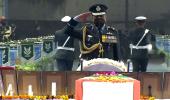A total of 31 people were killed in accidents involving 15 military helicopters since March 2017 that included the December 8 crash of the Mi-17V5 near Coonoor, according to details provided by the government in Lok Sabha on Friday.

The 15 choppers that met with accidents included four Advanced Light Helicopter (ALH), four Cheetah, two ALH (weapon system integrated) versions, three Mi-17V5, an Mi-17 and a Chetak.
Minister of State for Defence Ajay Bhatt shared the details of all helicopter accidents in the last five years in all three services.
He was replying to a question.
The list of crashes provided by him began with the accident involving a Cheetah helicopter of the Indian Air Force on March 15, 2017, in which no one was killed or injured.
Seven helicopters each from the Indian Army and the Indian Air Force were involved in accidents during the period while the number from the Navy was one, according to the details.
The data showed 31 people were killed and 20 injured in the accidents.
The total number of deceased in the 15 accidents included 14 people killed in the December 8 crash near Coonoor.
CDS Gen Bipin Rawat, his wife Madhulika and 12 armed forces personnel were killed in the crash.
To a specific query on the crash of an ALH Rudra (WSI) in Ranjeet Sagar dam near Pathankot on August 3, Bhatt said there was no restriction on the helicopter flying over the water body.
'Lt Col A S Bath and Capt Jayant Joshi lost their lives after their helicopter Rudra-WSI crash landed in Ranjeet Sagar Dam on August 3. There is no restriction on the helicopter flying over water,' the minister said.
'However, low flying over water needs specific authorisation. A Court of Inquiry has been ordered to investigate the crash,' he added.
Asked whether the pilots were not given specialised training required to fly over water, Bhatt said the training has been structured to meet the operational requirements.
He said, however, operations over a large expanse of water are restricted.
To a separate question, he said following the Pathankot incident, the government approved an integrated smart power fencing called Integrated Perimeter Security System (IPSS) for 23 airbases.
There was a terror attack on Pathankot airbase on January 2, 2016.
He said Bharat Electronics Ltd signed a contract with Indian Air Force for establishing the IPSS in the airbases across eight states.
He said the pilot site was commissioned in February 2021, adding the BEL has given sub-contract to many several Original Equipment Manufacturers (OEM) and system integrators to implement the project.











 © 2025
© 2025